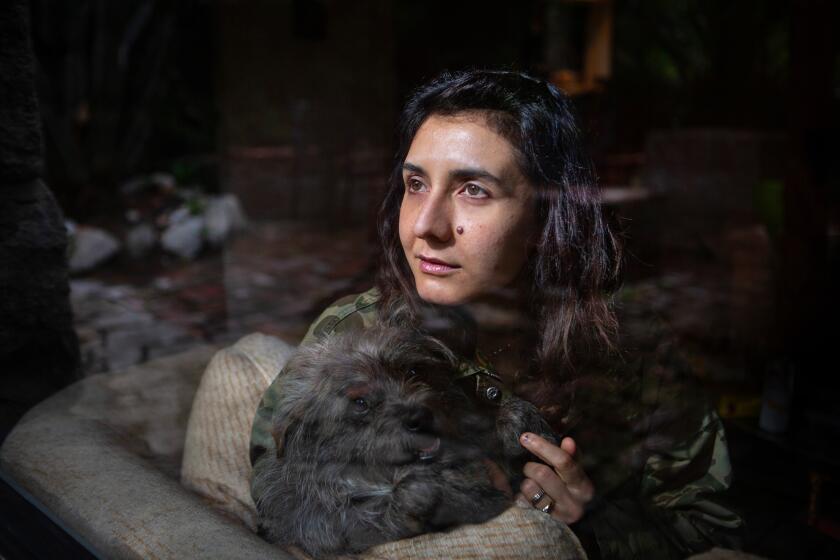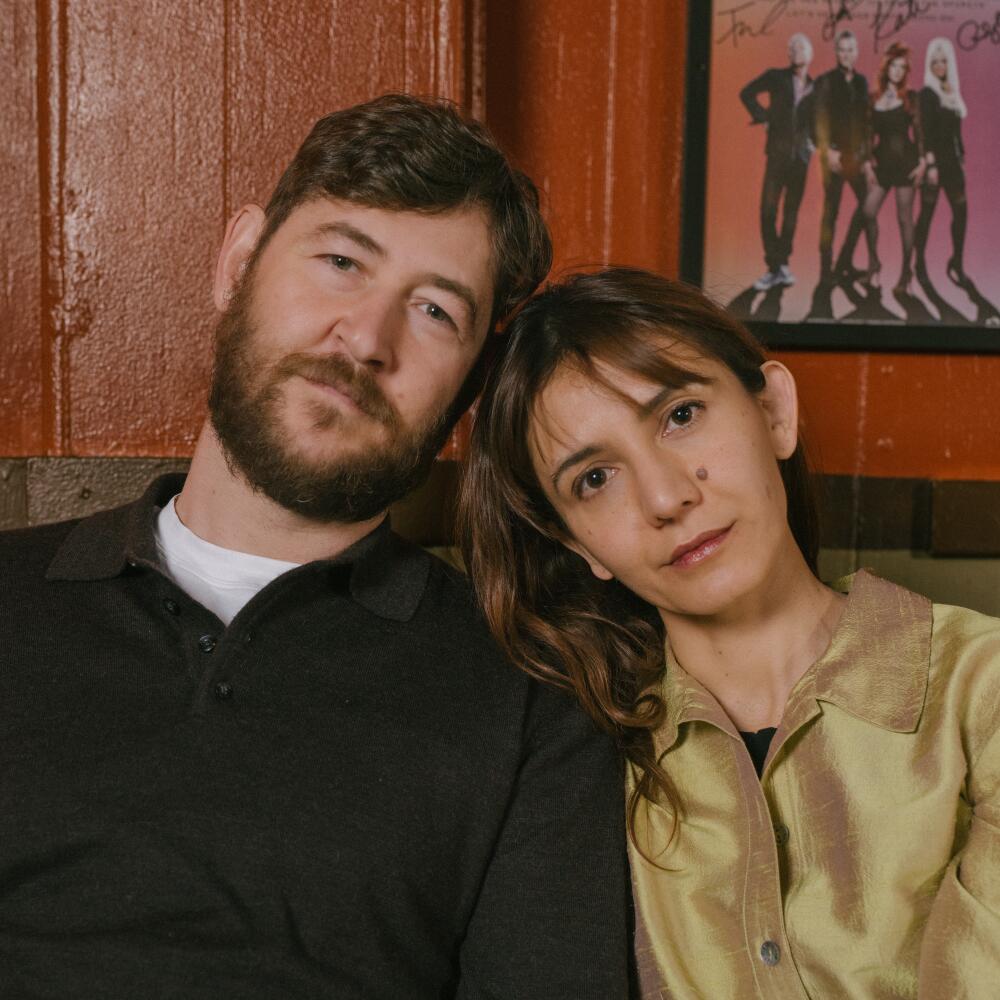
- Share via
The award should go to her co-screenwriter, Ottessa Moshfegh tells me. That award would be the Razzie for terrible acting. The co-writer, her husband and fellow novelist Luke Goebel, nominates her in turn. The couple test the dialogue in their scripts, and their acting chops, by playing the scenes together, which is how they wrote their new film, “Eileen.”
Teaming up in this way benefits their screenplays, Moshfegh believes. “There’s something to be said about having to expand your mind toward what the other person is seeing.” Goebel yes-ands that sentiment: “You have a line, and the next person makes it better, and the next person makes it better, and there’s a little bit of competition involved.”
Celebrated for her novels, occasionally vilified for a persona she can’t control, the author of “Death in Her Hands” is our prophet of loneliness.
“Eileen” is the duo’s adaptation of Moshfegh’s acclaimed 2015 novel of the same name. With William Oldroyd directing, the story became an entrancing Sundance favorite starring Thomasin McKenzie (“Leave No Trace”) and Anne Hathaway. McKenzie is the title character, an isolated young secretary at a boys prison in 1960s Massachusetts. Hathaway is Rebecca, a poised and progressive psychologist who joins the staff and instantly seduces Eileen, setting up one hell of a Christmas surprise. Shea Whigham is Eileen’s drunk ex-cop father, and Marin Ireland plays the mother of a boy incarcerated for killing his own cop dad. The film opens in select markets Friday and goes wide next week.
Adapting her own novel, Moshfegh found that having a co-writer restored fluidity to the story. The way she envisioned “Eileen,” she says, “it’s almost set in stone. These are decisions I made years and years and years ago, and I can’t imagine them in any other way.” But with Goebel, “we’ll be working on a scene that I’ll think is supposed to be some grueling, tormented argument, and he’ll suggest something that’s just f— hilarious that will give the whole thing more dimension.”
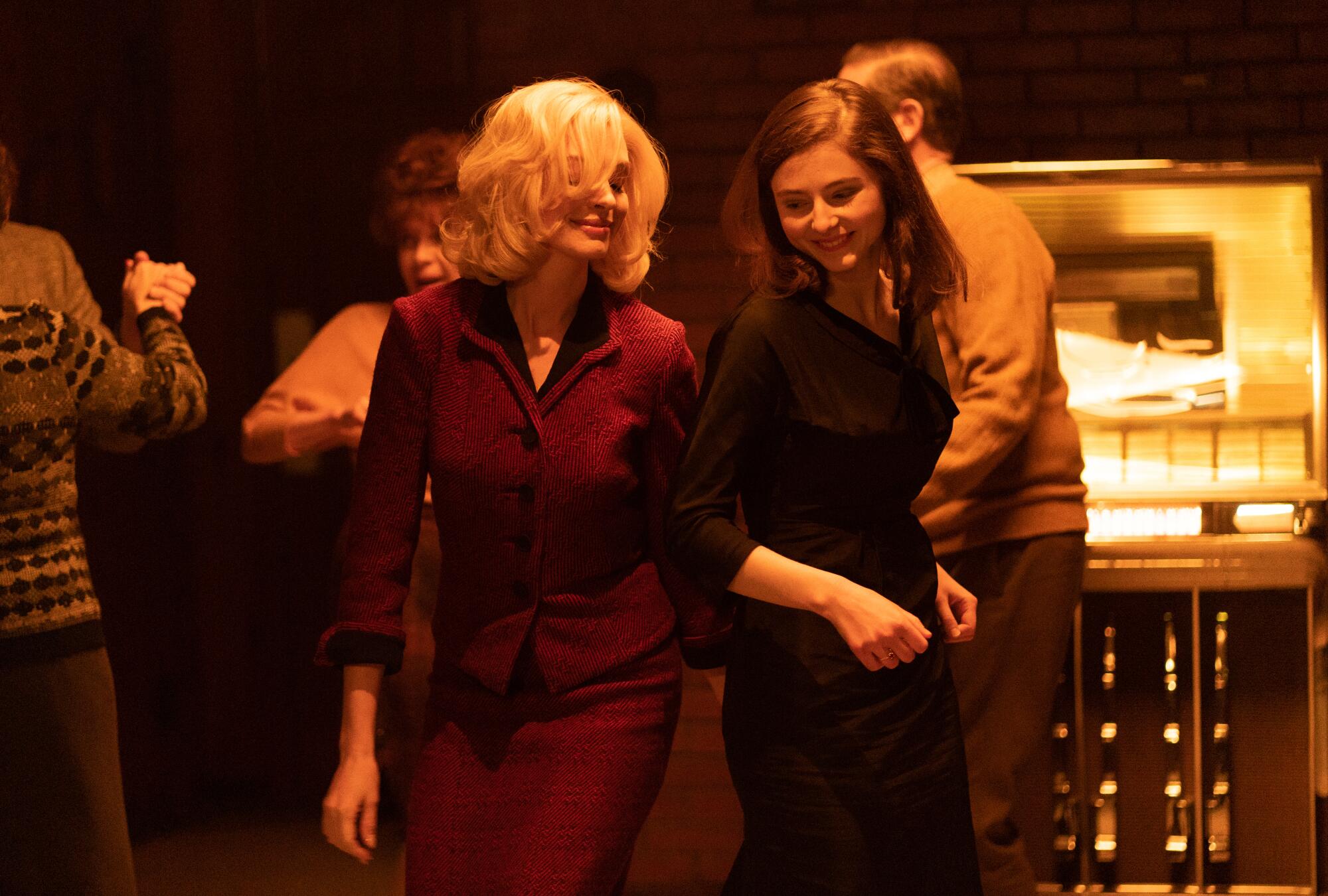
In the adaptation’s most consequential shift, Eileen no longer narrates from her perspective later in life. We glimpse a few of her fantasies, but all we know is what we see transpiring the week of the story. “It was just immediate and across the board that this was not a movie with voice-over,” Moshfegh says. “We were not giving access into Eileen, as a viewer — so that when Rebecca shows up, there’s the sense of an opening. That we never hear Eileen’s thoughts in the film makes her a more mysterious character but at the same time somehow more relatable.”
Moshfegh is best known for “My Year of Rest and Relaxation,” a 2018 bestseller about a woman in pharmaceutical hibernation that enjoyed a second life during the COVID lockdowns (her most recent book is last year’s “Lapvona”). Though the author, like Eileen, is from Massachusetts, she and Goebel now live in Pasadena. By the time they set to work on this adaptation, they had already made their Hollywood debut.
With a hunger for detachment and direction, the complicated unnamed narrator of Ottessa Moshfegh’s new novel begins a deep sleep regimen.
The team’s first screenplay was for last year’s “Causeway,” which New Orleans author Elizabeth Sanders initially adapted from her own story “Red, White and Water.” Moshfegh and Goebel worked on subsequent drafts for the nine weeks before shooting began, setting a precedent for their shared work schedule. “The cool thing about being married to your co-writer is that you can stay up until 4 in the morning and sleep for 45 minutes and just get up and keep working,” Moshfegh says, and laughs.
“Causeway,” which starred Jennifer Lawrence, was a traditional redemption narrative, dissimilar from Moshfegh’s twistier fiction. But the approach was the same one the pair would use for “Eileen,” according to Goebel: “Every line of dialogue, every action, everything we did, we would write together at that moment, kind of trial by fire.” As they’ve taken on more scripts, Moshfegh reports that their rhythm has changed. Now, it’s, “You do a pass, and I do a pass, and let’s come together and really beat this thing to death.”
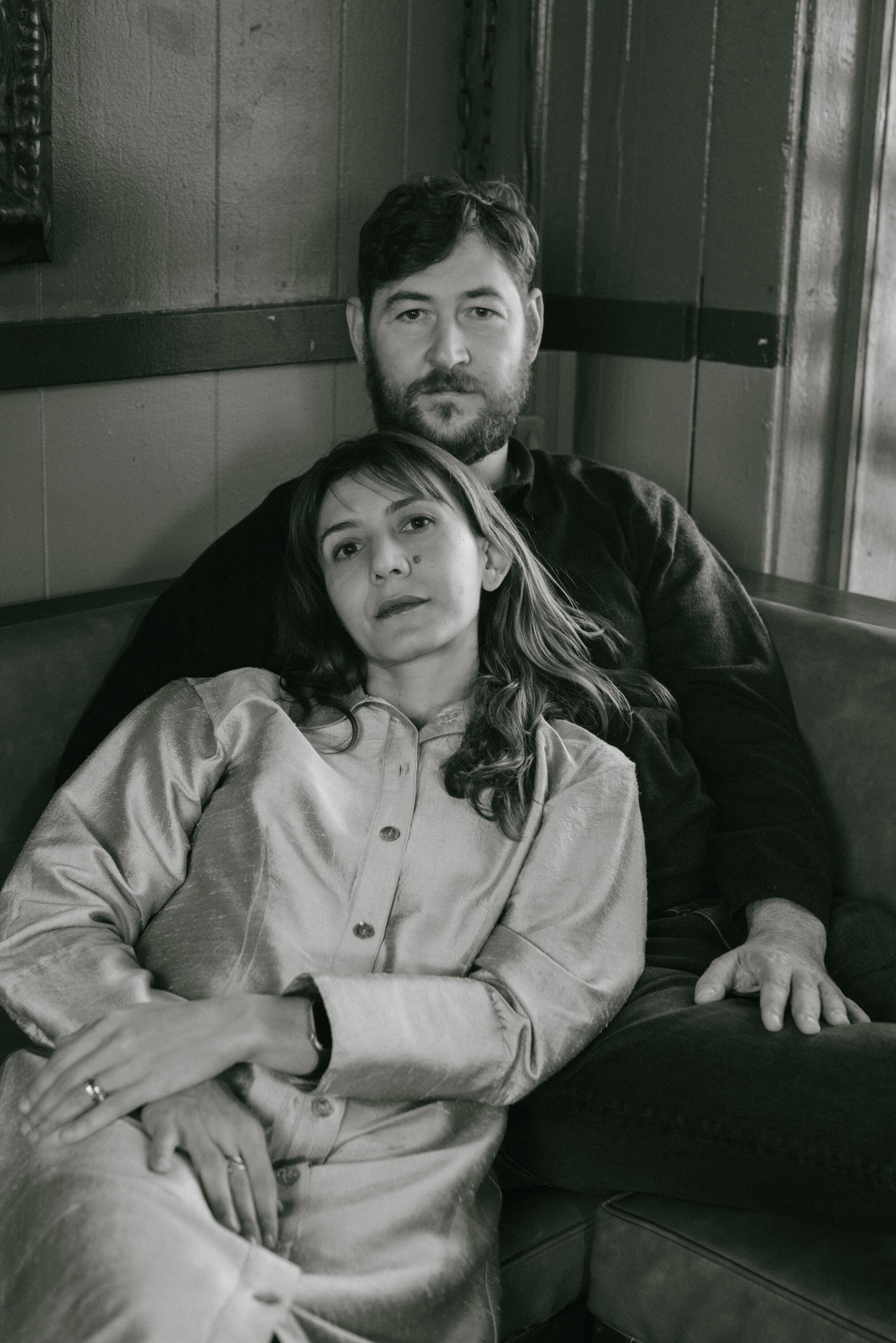
Moshfegh’s book “Death in Her Hands” came out during the pandemic — meaning she couldn’t promote it (like many authors, she found the experience “a real bummer”). But the book’s release led her to a Zoom meeting with Oldroyd. The veteran UK stage director previously adapted the Russian classic “Lady Macbeth of Mtensk” as “Lady Macbeth” (2016), a lauded feature film with Florence Pugh. When Moshfegh’s conversation with him drifted to “Eileen,” the writers knew they had to pursue it. “With Will, there’s a shared unflinching mischief and also a real responsibility to humans,” Goebel explains. “We can go from the perverse streaks to the really sincere gravity.”
As co-producers working with Oldroyd, the couple remained involved in the filmmaking process, which Goebel calls “a dream.” Key hires included cinematographer Ari Wegner (“The Power of the Dog”), supreme at capturing danger in daylight and romance in realism. Production designer Craig Lathrop, a Robert Eggers regular, re-creates the merciless grimness of winter in New England among its malcontent townies. A crescendoing jazz score from Richard Reed Parry of Arcade Fire invokes Miles Davis’ music for “Elevator to the Gallows.” These elements make “Eileen” sear the senses, sizzle through its end and smoke in the mind. “I think its impact is even more dramatic and charming and jarring and all of the things I wanted the book to be,” Mosfegh says.
One of my favorite lines in poetry is the opener to Anne Sexton’s 1962 “For Eleanor Boylan Talking with God,” which begins, “God has a brown voice,/ as soft and full as beer.”
As is common for literary adaptations, the screen version tightens the book’s timeline and heightens smaller moments of conflict. To advance the story visually, the film concretizes certain allusions and memories. More significantly, Rebecca enters in the first act rather than the second, soaring over the book’s long runway of exposition. But the film still lets us absorb the basics of Eileen’s exterior life before Rebecca sweeps in and transforms it.
“A lot is conveyed through her relationship with her father,” Moshfegh says. “Shea Whigham did her dad justice for sure. He’s mean, and I love him, and he’s dangerous, and I love him. I want him to be OK, and I want Eileen to be OK, and somehow that isn’t possible; they both can’t be OK.”

As Moshfegh puts it, Eileen is “vibrating in late puberty.” In the book, her habits include idle shoplifting, abusing laxatives and searching for gruesome photographs in books and magazines. She hates bathing, wears her dead mother’s clothes and keeps a decaying mouse in her glove box. None of the above appear in the film, though we see hints of her bodily mortifications and one hungover instance of virtuoso vomiting.
I asked the writers what made them dial down the protagonist’s quirks for the film, and they chuckle. “Some of that was subject to budgetary restrictions,” Goebel answers. “We had to cut a montage early on.” Yet, Moshfegh points out, “we can see her for who she is, because essentially, she’s a very tender, sensitive, young, curious person.”
Kristen Roupenian’s viral short story, ‘Cat Person,’ is now a feature film with a wildly different ending. It’s sure to be just as polarizing, but it works.
Eileen’s mild affect is also a kind of disguise. In the book, the character calls it her “death mask.” What we behold is “a girl who looks very innocent but has the capacity to be bold, aggressive, decisive, extremely opinionated, even cruel,” Moshfegh says. On the climax of the film, Goebel notes, “we’re in the realm of the physical. We’re watching these really charming performances in some ways, and we know something’s under the surface, but we’re not quite sure what. So when the swerve happens, it’s really shocking.”
When it came time for casting, Moshfegh remembers, “McKenzie’s audition was one of the last to arrive. Even just remembering watching it … I still get the chills.” As a viewer, it’s impossible to overstate the power of the actor’s face in the movie’s most critical moments, when Eileen neither speaks nor moves. Together with subtle camera work, these instances shift the story’s direction, our comprehension dawning with hers.
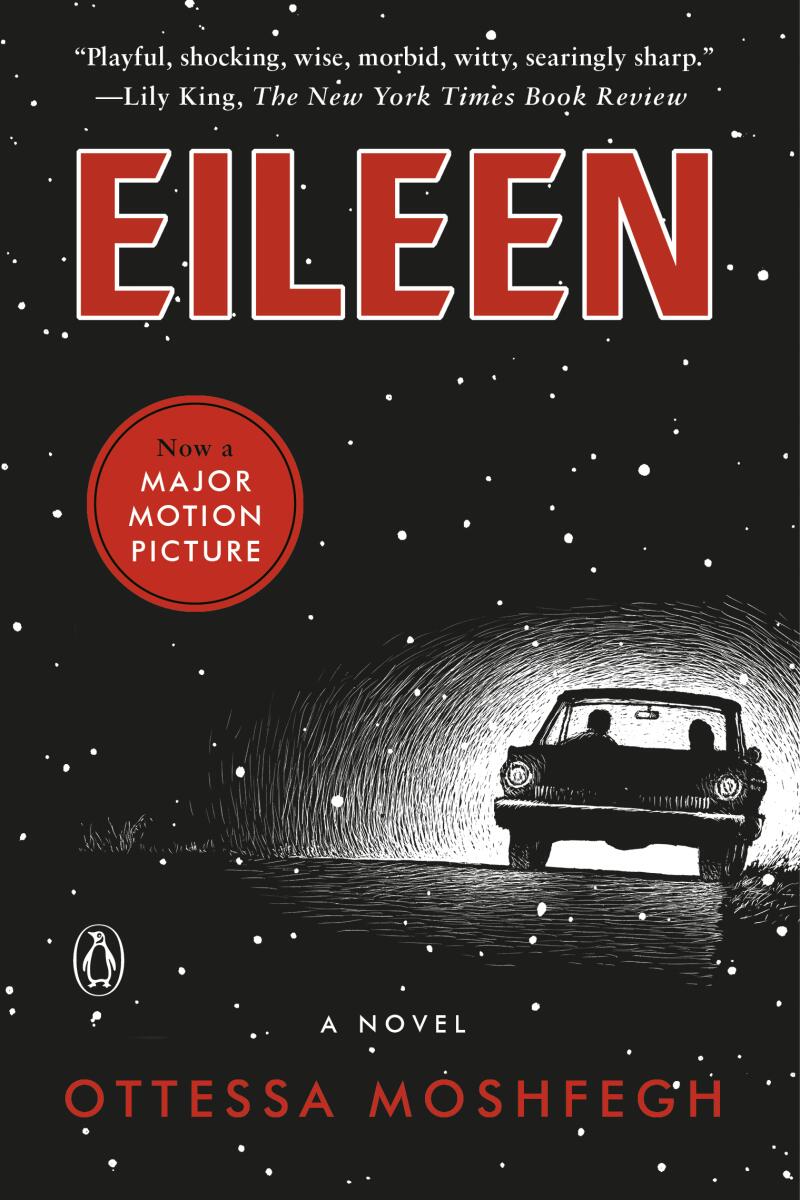
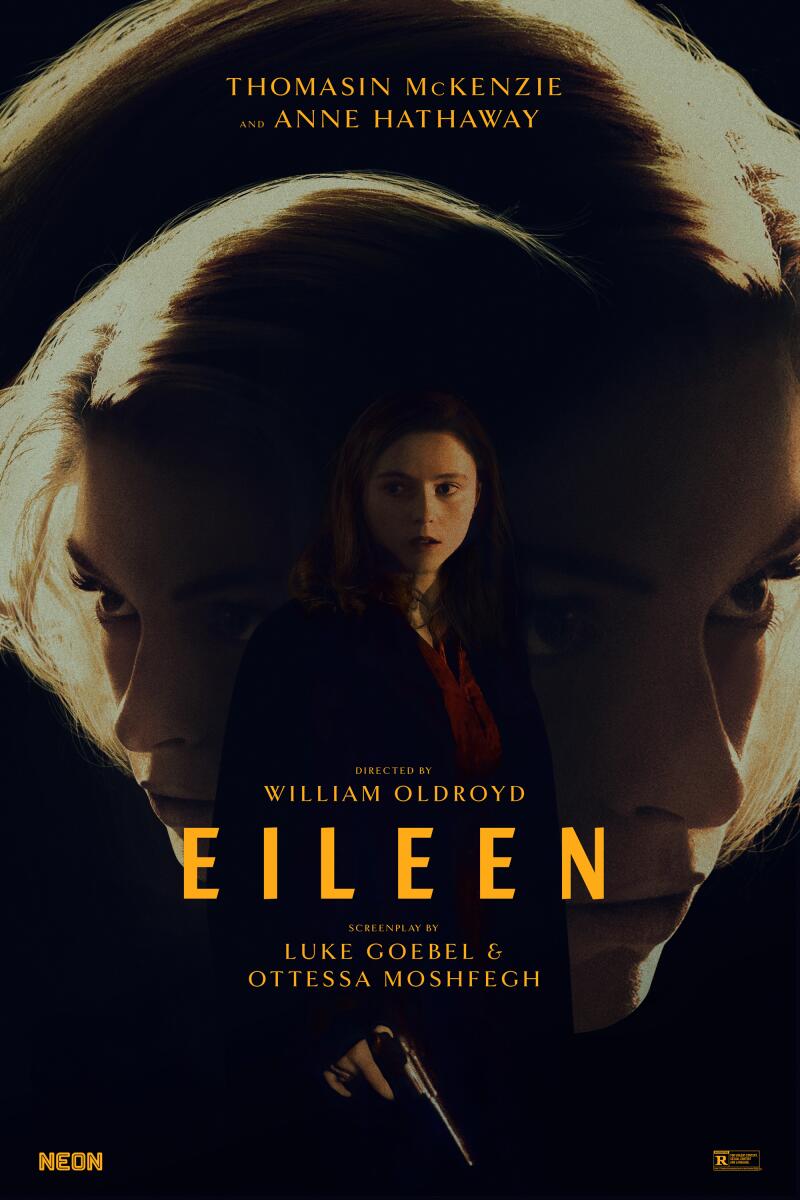
(Penguin Press / Courtesy of NEON)
Whereas the British McKenzie takes on a harsh Bostonian accent for the role, Hathaway adopts Rebecca’s acquired transatlantic speech (“the kind of accent you hear in old movies,” Eileen marvels in the book). Moshfegh praises Hathaway’s siren-style performance of the part. “She really turns Rebecca into the filmic magic that holds the movie together. Yeah, she’s a Hitchcock blond for sure.” The familiar trope sets expectations the film will subvert. “Suddenly Rebecca isn’t just a character, but a main player in the drama of a very real-life story.”
The writers are adapting other books of Moshfegh’s, including “My Year of Rest and Relaxation,” with Margot Robbie producing and Yorgos Lanthimos attached to direct (“the ball is slowly rolling,” Moshfegh allows). They’re also at work on a new project with Oldroyd, an original screenplay based on true events — about which they will say no more.
Our BuzzMeter film experts are back to predict what Oscar voters will nominate in 10 Academy Awards categories. Vote in the online polls!
Whatever the writers take on, the life they share enriches their projects. “The nature of our relationship, and the intimacy, and the conflicts and the wisdom of being with another person, gets into the work,” Goebel says. “So dynamics between characters, couples, objects of infatuation — whatever it is, is richer, because we’re bringing our experience there. If I were single, I would never have reached some of these places.”
Johnson writes the Times’ Page to Screen column. She lives in Los Angeles.
More to Read
From the Oscars to the Emmys.
Get the Envelope newsletter for exclusive awards season coverage, behind-the-scenes stories from the Envelope podcast and columnist Glenn Whipp’s must-read analysis.
You may occasionally receive promotional content from the Los Angeles Times.
